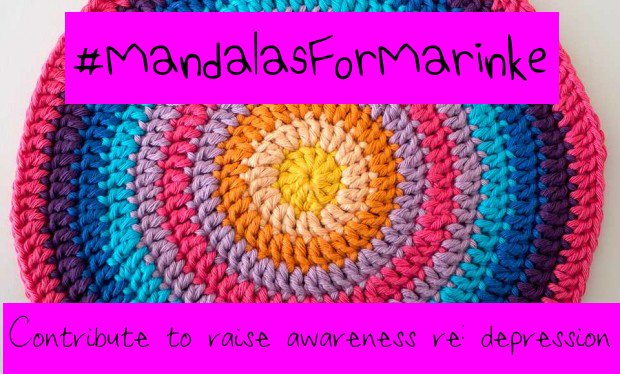
Here is the next of the beautiful, inspiring, special contributions coming in to the #MandalasForMarinke remembrance project. I am grateful for each and every amazing contribution. You are invited to join; learn more here.
Beautiful Crochet Mandala
This magical crochet spoke mandala uses a different color for each round, getting brighter and darker as it works its way outwards but ending with pretty lightness in the pink and soft blue. Wonderful!
Meet the Maker
This lovely mandala comes from Bahar Tan Cakar in Turkey who writes:
“I lost my sister-in-law almost four months ago in the same way. She gave us the most precious gift; my nephew. Now I’m trying to remember all of the good memories about her so that I can tell him all of them when he grows up. I hope that Marinke’s family is able to hold on to their good memories.”
Connect with @bahartancakar on Instagram.
Words by Wink
In March 2015, Wink wrote in a photo post:
“I love making these abstract photos of light, like this last one; where you can’t see what’s actually in the photo but it does tell you exactly what mood there was at that time. I’ve got a whole bunch of them, and I’m actually thinking of framing the three best ones and hanging them in my bedroom, on the opposite wall of my bed.”
About Depression
Since today is September 11th, I wanted to share some information about depression as it relates to the 9/11 attacks in America. These tragedies cause an understandable impact of both PTSD and depression in survivors. A survey taken 5-8 weeks after the attacks occurred found:
“Respondents reported post-attack rates of depression and PTSD that were approximately twice the baseline levels previously documented in a 1999 benchmark national study. Some 9.7 percent had symptoms of depression.”
Shortly after 9/11, there was at least one suicide by the widow of a survivor. The impact continued over time, though, with related suicides reported including a 2006 death from an airline employee who checked in one of the hijackers and a 2008 death from a janitor who helped save someone from the building but was forever changed that day.
Depression, suicide, PTSD, substance abuse and violence all increase after national tragedies and, of course, this isn’t limited to 9/11.
“Nancy Anthony, executive director of the Oklahoma City Community Foundation, which operated a $40 million recovery fund for victims and rescue workers, said that six years after the disaster, the organization has dozens of open cases, individuals who are still emotionally or physically disabled by the bombing.
“I guess we originally thought that we would be out of the emergency assistance business within the first year,” Anthony said. “But you’re dealing with a grieving process, and some people get through it and go on, and other people don’t. And then some people think that they’re doing just fine, and then the holidays hit . . . or somebody’s birthday or the first anniversary of the event comes along, and then all of a sudden they become unable to function.”
Looking back at Oklahoma City, Anthony and the Red Cross said they eventually realized that rescue workers were among the hardest hit but among the last to seek help. About three months after the bombing, Anthony said, some firefighters, police officers and emergency medical personnel who had worked at the site began showing up with substance abuse problems. Domestic violence complaints also increased. Months later, the workers were struggling to sleep or having emotional difficulties on the job.” -source
While first responders have the biggest impact and the experience is devastating for those close to an attack, depression can come even to people in other parts of the world who are just watching the news about the event.
“Measurements taken 3–5 days after 9/11 suggested that 44% of the adult US population experienced substantial stress. Findings from subsequent national studies also showed that individuals across the country experienced fear and insecurity, and had increased rates of post-traumatic stress (PTSD) symptoms 2 months later.”
The Journal of Traumatic Stress reported on research that found that people working and living in New York at the time were still experiencing related depression and/or PTSD ten years later.
All contributions to Mandalas for Marinke are welcome and will help raise awareness about depression while honoring her work in the same way that this great contribution has done today. Details to join here.





